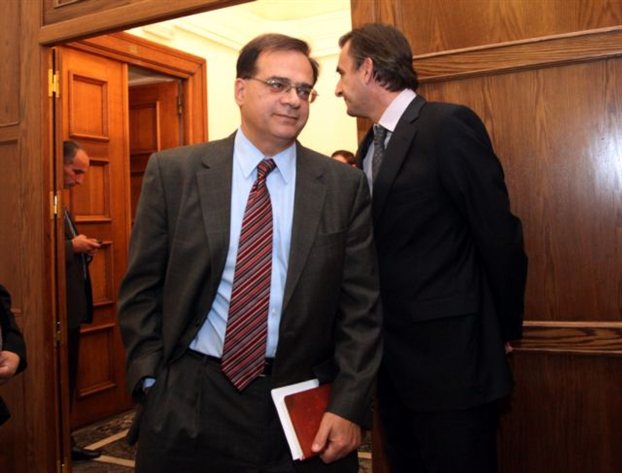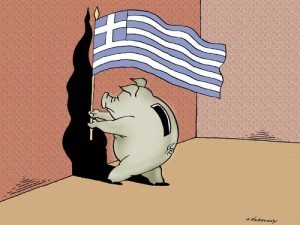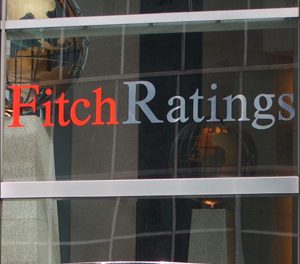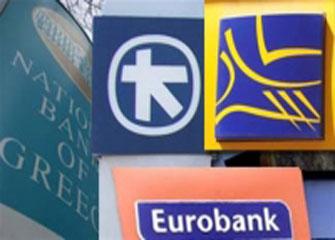By
ATHENS — The first time Gikas Hardouvelis left his job as a bank economist to try his hand at Greek politics, in 2000, the country was preparing to join the euro currency union, looking forward to a period of prosperity and optimism.
The second time, in late 2011, Greece was teetering on the brink of a disastrous exit from the common currency, its finances and politics in free fall.
Now, as the country’s finance minister, Mr. Hardouvelis aims to steer Greece out of its catastrophic recession, his hopes lifted by the first indications of an upturn.
“A pessimist would say, ‘Everything is difficult around the world — in Europe, how can you grow?' ” Mr. Hardouvelis, a Harvard-educated economist, said recently in his Athens office. It was his first interview since joining the government in a cabinet reshuffling in June. “An optimist would say, ‘Once you’ve fallen so much, it’s easy to pick up.' ”
Mr. Hardouvelis is the first finance minister since the onset of the country’s four-year economic crisis to assume his role in the face of predictions that things will get better rather than worse. The Greek economy, now 25 percent smaller than in 2009, is expected to grow 0.6 percent this year.
And because Greece recorded a primary surplus in the spring — a budget in the black before debt repayments — it is eligible to begin exploratory talks with its international creditors about easing its huge debt burden, which stands at 174 percent of gross domestic product.
Success, though, will require him to enforce economic changes pledged to Greece’s troika of international creditors: the European Commission, the European Central Bank and the International Monetary Fund. They have kept the country afloat since 2010, when it narrowly avoided bankruptcy, with rescue loans worth 240 billion euros, or $317 billion.
Three days of talks with representatives of the troika on the progress of those changes are to begin on Tuesday. Analysts and international economists are divided about his chances of success.
In his previous political roles, Mr. Hardouvelis was only an adviser, first to the Socialist prime minister Costas Simitis from 2000 to 2004, and later to the technocrat prime minister Lucas Papademos, who was installed in late 2011 to lead a six-month coalition government after the previous Socialist administration collapsed.
Now, as a senior member of Prime Minister Antonis Samaras’s coalition government, Mr. Hardouvelis’s challenge is to administer harsh medicine that the recession-weary Greek public is finding tough to swallow.
The regimen will include modernizing an antiquated tax system, introducing a new property tax that aims to spread the burden more evenly and continuing a crackdown on tax evasion.
The second overhaul of Greece’s retirement system since 2010 is already in progress. It involves consolidating dozens of pension funds into three. An effort is underway to cut about 6,500 jobs from the Civil Service. Privatization of many state-owned assets, which has long been on the to-do list but has yet to show much progress, is back in focus, as potential buyers — chiefly from China — eye airports and other infrastructure.
Some experts maintain that Mr. Hardouvelis is the right man for the job, saying he has an ideal mix of experience and abilities. A widely cited academic, he has advised private and state banks, including the New York Federal Reserve, and has engaged in politics and diplomacy during critical moments in Greece’s recent history.
“He has a strong reputation in international economic policy circles, which should be extremely helpful in negotiating with international creditors,” said Kenneth S. Rogoff, a professor of economics at Harvard and a former adviser to the International Monetary Fund. “Of course, his task of trying to restore growth in a country with weak institutions that faces strong creditors is not an easy one.”
Others say he lacks the combative nature required for Greek politics and imposing his will on a reluctant populace.
Jens Bastian, an economic consultant and former member of the European Commission’s task force in Athens, compared Mr. Hardouvelis with his predecessor, Yannis Stournaras, who now heads the Greek central bank but had experience running a private bank before he was tapped for the ministry.
“He never held front-line positions which required him to sign decisions like Stournaras,” Mr. Bastian said.
The new minister’s first real test will come when he meets with the troika’s representatives. After the coming talks in Paris, the parties will reconvene later in September in the Greek capital — a symbolic move intended to indicate that Greece is ready to assume greater control of its actions.
“Greece has done most of the reforms; the next phase is to solidify them, to make sure they don’t reverse,” Mr. Hardouvelis said. “I think it will be done in a more efficient way in the future, precisely because the troika is not right on our neck. They’ll be staying in the background.”
Of the €240 billion in rescue loans pledged to Greece by the troika since 2010, only a small portion remains to be disbursed: €1.8 billion from the European side and €15.6 billion from the I.M.F.
The loans have been dispensed in installments in exchange for painful austerity measures, including Civil Service salary cuts and tax increases that have reduced personal incomes by a third, left nearly one in three Greeks unemployed and shrunk the economy by a quarter.
Greek officials contend that it is in the troika’s interest to hold off on additional austerity. “They have an incentive to allow us to let the economy grow because then we can better service our debt,” Mr. Hardouvelis said. He said he was eager to draft a growth plan, investing in promising sectors like agriculture and shipping to create jobs and to diversify exports beyond the economically anemic European Union.
A debt restructuring in 2012 required private sector bondholders to forgive some €100 billion, but the prospect that Greece’s creditors will share the pain this time is essentially off the table. As the eurozone teeters on the brink of recession once again, member states, particularly Germany, are in no mood to ask their taxpayers to incur losses.Greece’s aim, instead, is to reduce the cost of servicing its debt through lower interest rates or longer maturities. “Our debt is big, but it’s also very long term, so it’s easily serviceable,” Mr. Hardouvelis said.
He added that the government planned to tap international markets with a new bond issue in the coming weeks, the third round of fund-raising in three months after four years during which financial markets were essentially closed to Greece.
Problems in the broader eurozone — stagnation in Italy and France and political jousting over the continued fiscal discipline championed by Germany — may now favor Greece, Mr. Hardouvelis said, smiling apologetically at the irony. The eurozone’s slump, he said, “necessitates an expansionary monetary policy, which keeps interest rates down and keeps borrowing costs down.”
When troika inspectors arrive in Athens, Greece’s budget will once again come under a microscope. Mr. Hardouvelis bristles at the suggestion that inspectors might take a hard line, noting that foreign auditors originally doubted Greece’s predictions of a primary surplus, only to be proved wrong in the spring. “I hope this has taught them a lesson, and they don’t insist so much on the fiscal side,” he said, noting that a Greek recovery would be undercut by any “new, onerous targets.”
Mr. Hardouvelis, the son of farmer from a small fishing village in Greece’s southern Peloponnese peninsula, said he was sensitive to the social effects of the long siege of austerity. And despite his Harvard pedigree — he went there on a scholarship — Mr. Hardouvelis makes it clear he does not consider himself part of the entitled Greek political elite.
“I understand what unemployment is,” said Mr. Hardouvelis, 58, who is married with two children, one still a student, the other doing his obligatory military service. “I didn’t have a dad who would send me $1,000 a month to make it at college.”
Greeks are overtaxed, he said, but he added that tax relief would need to be preceded by growth. There may be action, though, to temper some “extreme cases” — like a tax on heating oil, which has fallen short of revenue targets while having a negative effect on the environment because Greeks have turned to burning wood to heat their homes.
Mr. Hardouvelis contends that the current government is leading a more “mature” society and that the lackluster results of anti-bailout opposition parties in elections to the European Parliament in May signal a public realization that there is no viable alternative to the country’s living within its means — however meager for now.
“Greeks don’t buy promises anymore,” he said. “They know they will be the ones that have to finance them.”



















